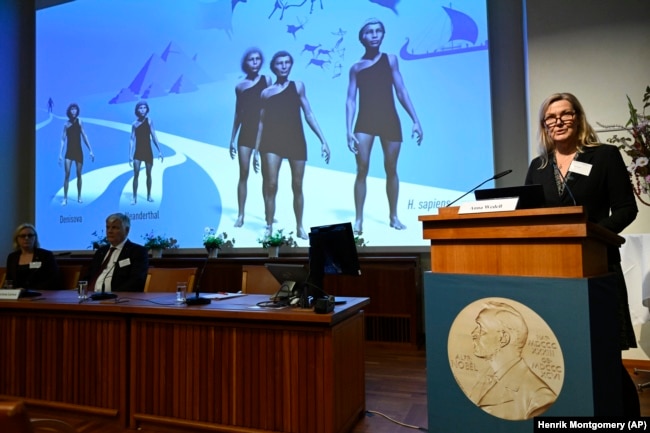2022ノーベル医学賞
古代人類の骨からDNAが解析できる今。
私たち日本人は、ネアンデルタール人とデニソワ人のDNAを引き継いでいることが判明!!
これによりコロナなど感染症に対する現代人の免疫システムの反応を解明できるとは!! 凄いです❤️
VOAで英語を学びましょう!!
- スウェーデン人科学者、初期人類の研究でノーベル医学賞を受賞(和訳)
- Swedish Scientist Wins Nobel Prize in Medicine for Research on Early Humans
スウェーデン人科学者、初期人類の研究でノーベル医学賞を受賞(和訳)
Swedish Scientist Wins Nobel Prize in Medicine for Research on Early Humans
October 04,2022
スウェーデンの科学者スヴァンテ・ペーボ氏が、人類の進化に関する発見で、月曜日、ノーベル医学賞を受賞しました。彼の研究は、我々の免疫システムが大昔の祖先とは異なる働きをすることを示したと、ノーベル賞グループは述べています。
新しい手法
ペイボ氏は、ホモ・サピエンスとして知られる現代人と、ネアンデルタール人やデニソワ人のような近縁種の遺伝子を比較できる新しい手法の開発を主導しました。
科学者たちは19世紀半ばに初めてネアンデルタール人の骨を発見しました。しかし、ネアンデルタール人の遺伝暗号、DNA、を調べることで、種族間のつながりを完全に理解することができるのです。ペーボー氏は、現代人とネアンデルタール人が種として別々の道を歩むようになった時期について研究しています。それは約80万年前のことです。
アンナ・ウェーデル氏はノーベル委員会の委員長を務めています。彼女は、「ペーボ氏と彼のチームはまた、驚くべきことに、ネアンデルタール人からホモ・サピエンスへの遺伝子流動が起きていたことを発見し、共存していた時期に一緒に子供を作っていたことを実証しました。」と述べています。
この古代人類種間の遺伝子の移動は、現代人の免疫システムが、コロナウイルスのような感染症にどのように反応するかに影響します。アフリカ以外の人々は、ネアンデルタール人の遺伝子を1〜2%持っています。
新種の人類の発見
ペーボ氏と彼のチームは、シベリアの洞窟で発見された小さな指の骨からもDNAを回収しました。その結果、彼らはデニソワ人と呼ばれる新種の古代人類を発見しました。
ウェーデル氏はこれを "センセーショナルな発見 "と表現しています。その情報をもとに、研究者たちはネアンデルタール人とデニソワ人が近縁のグループであることを明らかにしました。彼らは約60万年前に互いに分かれたのです。デニソワ人の遺伝子は、アジアと東南アジアの現代人の最大6パーセントに見つかっています。
「アフリカから移住してきた後、彼らと混血することによって、ホモ・サピエンスは新しい環境で生き残る可能性を高める配列を手に入れたのです」とウェーデル氏は言います。例えば、チベット人はデニソワ人と遺伝子を共有しており、高山地帯での生存に役立っています。
ニルス-ヨーラン・ラーション氏はノーベル賞の評議員です。彼はAP通信に、「スヴァンテ・ペーボ氏は我々の最も近い親戚の遺伝子構成を発見しました。そして、これらの絶滅した人類の姿と現在の人類の我々とのわずかな違いは、我々の身体機能や脳がどのように発達してきたか等についての重要な洞察を与えてくれるでしょう。」と語っています。
ペーボ氏は月曜日に受賞を知り、驚きました。ノーベル委員会から電話を受けたとき、彼の夏の家で何かが壊れたと思ったそうです。
父と息子、共にノーベル賞受賞
ペーボ氏は67歳で、ミュンヘン大学とドイツ・ライプチヒのマックス・プランク進化人類学研究所で研究していました。ペーボ氏は、1982年にノーベル医学賞を受賞したスネ・バーグストロム氏の息子です。ノーベル財団によると、ノーベル賞受賞者の息子や娘もノーベル賞を受賞するのは今回で8回目だということです。
デイビッド・ライヒ氏はハーバード・メディカル・スクールの遺伝学者です。彼は、DNAが何万年も保存できることを認識し、—それを回復する方法を開発することによって、— ペーボ氏と彼のチームは、我々の過去についての疑問に答える全く新しい方法を作り出したと述べました。そして、彼らの研究が、古代DNA研究の”爆発的な成長”につながったと付け加えました。
カテリーナ・ハーヴァティ-パパテオドルー氏は、ドイツのテュービンゲン大学の古人類学の教授です。彼女は、今回の受賞は、COVID感染症など、今日の人間の健康について洞察を得るために、人類の進化を理解することの重要性に注意を喚起するものであると述べています。
この医学賞は、ノーベル賞の発表が行われる1週間の始まりです。この賞には約90万ドルの賞金が授与されます。
Swedish Scientist Wins Nobel Prize in Medicine for Research on Early Humans
Swedish scientist Svante Pääbo won the Nobel Prize in medicine on Monday for his discoveries on human evolution. His work shows how our immune system works differently from our long-ago ancestors, the Nobel group said.
New methods
Pääbo has led the development of new methods that permit researchers to compare the genes of modern humans, also known as Homo sapiens, and that of some human relatives, like the Neanderthals and Denisovans.
Scientists first found Neanderthal bones in the mid-19th century. But looking at their genetic code, or DNA, helps them fully understand the links between species. Pääbo studies the time when modern humans and Neanderthals went separate ways as a species. That was around 800,000 years ago.
Anna Wedell is chair of the Nobel Committee. She said, "Pääbo and his team also surprisingly found that gene flow had occurred from Neanderthals to Homo sapiens, demonstrating that they had children together during periods of co-existence.”
This movement of genes between ancient human species affects how the immune system of modern humans reacts to infections, such as the coronavirus. People outside Africa have 1-2 percent of Neanderthal genes.
Discovery of a new human species
Pääbo and his team also recovered some DNA from a tiny finger bone found in a cave in Siberia. This led to the recognition of a new species of ancient humans they called Denisovans.
Wedell described this as "a sensational discovery." With that information, researchers showed Neanderthals and Denisovans to be related groups. They split from each other around 600,000 years ago. Denisovan genes have been found in up to 6 percent of modern humans in Asia and Southeast Asia.
"By mixing with them after migrating out of Africa, Homo sapiens picked up sequences that improved their chances to survive in their new environments," said Wedell. For example, Tibetans share a gene with Denisovans that helps them live in high mountain areas.
Nils-Göran Larsson is a Nobel Assembly member. He told the Associated Press, “Svante Pääbo has discovered the genetic makeup of our closest relatives. And the small differences between these extinct human forms and us as humans today will provide important insight into our body functions and how our brain has developed and so forth."
Pääbo was surprised to learn of his win on Monday. He thought something had been broken in his summer house when he got the call from the Nobel committee.
Father and son both Nobel winners
Pääbo, 67, did his work at the University of Munich and at the Max Planck Institute for Evolutionary Anthropology in Leipzig, Germany. Pääbo is the son of Sune Bergstrom, who won the Nobel prize in medicine in 1982. The Nobel Foundation says this is the eighth time that the son or daughter of a Nobel prizewinner also won a Nobel Prize.
David Reich is a geneticist at Harvard Medical School. He said by recognizing that DNA can be preserved for tens of thousands of years — and developing ways to recover it — Pääbo and his team created a completely new way to answer questions about our past. Their work, he added, led to "explosive growth" of ancient DNA studies.
Katerina Harvati-Papatheodorou is a professor of paleoanthropology at the University of Tübingen in Germany. She said the award draws attention to the importance of understanding human evolution to gain insights about human health, such as COVID infections, today.
The medicine prize begins a week of Nobel Prize announcements. The prizes carry a cash award of nearly $900,000.
Words in This Story
evolution – n. a process of gradual change that takes place over many generations, during which species of animals, plants, or insects slowly change some of their physical characteristics
species – n. class of plants or animals whose members have the same main characteristics and are able to breed with each other.
occur – v. to happen
sensational adj. so remarkable that it causes great excitement and interest.
sequence - n. a DNA sequence is the order in which the elements making up a particular gene are combined
insight – n. knowledge and understanding


